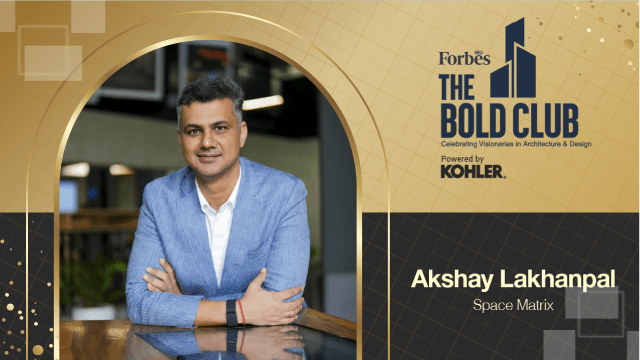
Akshay Lakhanpal : CEO, India – Space Matrix Design Consultants
Akshay Lakhanpal is the CEO—India of Space Matrix Design Consultants, a global design consultancy specializing in workplace design. In his career spanning more than two decades, he has won numerous awards for his exceptional designs, which focus on sustainability and innovation. At Space Matrix, Lakhanpal’s team’s mission is to create workspaces that are a positive catalyst for people’s empowerment, business growth, and sustainability. Their designs are backed by extensive research, team dynamics, ideation, and conceptualization through continuous feedback and testing. Lakhanpal envisions AI revolutionising the workplace design industry by offering personalised workplaces, predictive design, enhanced sustainability, data-driven decision-making, and automation of repetitive tasksWith ethical and responsible implementation AI can contribute to smarter, more sustainable, and human-centric environments that empower people and drive organizational success. Lakhanpal advises young architects and designers to embrace interdisciplinary collaborations, use technology responsibly and ethically, and prioritize human well-being while providing sustainable and innovative solutions.
Akshay Lakhanpal is the CEO—India of Space Matrix Design Consultants, a global design consultancy specializing in workplace design. In his career spanning more than two decades, he has won numerous awards for his exceptional designs, which focus on sustainability and innovation.
“Architecture is a fascinating convergence of art, science, mathematics, sociology, and psychology and offers the unique ability to shape human lives through the built environment.”
For Lakhanpal, this ability of design to influence emotions, behaviours, and productivity was a compelling force that led him to pursue architecture as a career. Inspired by ‘The Fountainhead’ by Ayn Rand and guided by his father, he found his calling in architecture, which stemmed from its unique blend of disciplines.
At Space Matrix, Lakhanpal’s team’s mission is to create workspaces that are a positive catalyst for people’s empowerment, business growth, and sustainability. By embracing ‘Design Thinking’ as their guiding principle, they create bespoke solutions tailored to each client's unique needs and aspirations. Their designs are backed by extensive research, team dynamics, ideation, and conceptualization through continuous feedback and testing. Beyond functionality, they strive to create spaces that evoke emotions, embody corporate culture, and enhance user experience.
Lakhanpal’s philosophy of aligning workplace designs with the organization’s DNA of values, culture, workstyles, and aspirations is evident in several projects. ‘Nestle India’ project exemplifies this vision where the design has various spaces catering to diverse workstyles fostering a culture of trust and innovation. Another example is the ‘BoAt’ project, where creating functional and inspiring spaces helped the company reinforce its brand identity and foster a culture of innovation and creativity. Other significant projects like ‘HCA’ and ‘Kyndril’ demonstrate how workspace design can be leveraged to attract top talent, build brand identity, and cultivate a sense of belonging.
Lakhanpal envisions AI (Artificial Intelligence) revolutionising the workplace design industry by offering personalised workplaces, predictive design, enhanced sustainability, data-driven decision-making, and automation of repetitive tasks. However, Lakhanpal stresses that AI should augment and not replace human creativity and expertise. With ethical and responsible implementation AI can contribute to smarter, more sustainable, and human-centric environments that empower people and drive organizational success.
With the world facing challenges like climate change, urbanization, and evolving human needs, architects need to provide human-centric, data-driven, and technology-enabled solutions. Lakhanpal advises young architects and designers to embrace interdisciplinary collaborations, use technology responsibly and ethically, and prioritize human well-being while providing sustainable and innovative solutions. He implores them to cultivate a lifelong learning mindset, stay abreast of the latest technologies and trends, and continuously seek opportunities to expand their knowledge and skills.